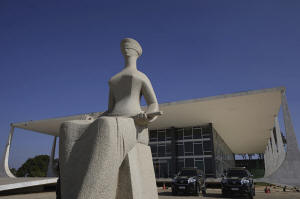Brazil confronts military officers accused of plotting a coup in
historic trial
[June 25, 2025]
By MAURICIO SAVARESE, ELÉONORE HUGHES and GABRIELA SÁ
PESSOA
SAO PAULO (AP) — When Lt. Col. Mauro Cid arrived at Brazil's Supreme
Court on Tuesday to testify against his onetime ally, former Defense
Minister Gen. Walter Braga Netto, he did not salute the senior officer.
It was a departure from military protocol that underscored how the
country’s once hugely popular military has been divided and roiled by
scandal as Brazil tries an explosive case in which top military officers
are accused of helping former President Jair Bolsonaro attempt a coup to
remain in power after losing an election.
Analysts said that the two men's appearance in a civilian court marked a
historic departure from the impunity senior military officers have
enjoyed since the country underwent two decades of military rule.
“Putting a colonel up against a general levels the playing the field and
signals that for the justice system, all defendants are equal,” said
Lucas Figueiredo, the author of several books about Brazil's
dictatorship. "The truth will prevail.”
Accusations of a coup
Cid, a former aide-de-camp to Bolsonaro who signed a plea bargain to
cooperate with authorities, has already testified that Braga Netto took
part in a meeting in November 2022 during which military officials
discussed plans to stop current President Luiz Inácio Lula da Silva from
taking office.
Braga Netto is a close ally of Bolsonaro who also served as the former
president's chief-of-staff and his 2022 running mate.
The officers are standing trial alongside Bolsonaro, several other
officers, and a few civilians. They face five charges including
attempting to stage a coup, involvement in an armed criminal
organization, attempted violent abolition of the democratic rule of law,
aggravated damage and degredation of listed heritage.

A verdict is expected by the end of 2025.
Cid says that in the days after Bolsonaro lost to Lula, he was called to
Braga Netto's office and handed a bag of cash to distribute to Bolsonaro
supporters camped outside the military headquarters. Braga Netto denies
the account and calls Cid a traitor.
The two men were summoned to the Supreme Court on Tuesday for a
confrontation, a step in Brazilian legal procedure in which the judge
and both parties can interrogate witnesses about discrepancies in their
testimony.
The examination was conducted behind closed doors by order of Supreme
Court Justice Alexandre de Moraes, who is chair the coup probe and did
not provide more details about the decision. Brazilian law allows closed
court hearings when matters of national security or deeply personal
matters are involved.
Braga Netto arrived at the court in the country’s capital of Brasilia
from his jail cell in Rio de Janeiro, where he has been detained for
obstructing investigations since December.
A staffer of the Supreme Court who observed the testimony told The
Associated Press that both Braga Netto and Cid mostly stuck to their
contradictory versions of events and avoided even looking at each other
despite sitting opposite one another.
The staffer spoke on condition of anonymity as they were not authorized
to brief the media.
[to top of second column]
|

Lady Justice statue, depicting a seated, blindfolded woman holding a
sword, stands outside the Supreme Court in Brasilia, Brazil, Sept.
2, 2024. (AP Photo/Eraldo Peres, File)

In a heated exchange, the former defense minister shot back that Cid
was a “liar,” said Braga Netto’s lawyer, José Luis Oliveira.
Moraes' decision to call both men for questioning at the same time
signaled the judge’s lack of confidence in their testimonies, legal
experts and officials said.
Brazil's military has long enjoyed impunity
The fact that the two men appeared in a civilian court at all was a
break from decades of impunity enjoyed by Brazilian senior officers.
No one in Brazil has been sent to jail on charges related to the
1964-1985 military dictatorship, unlike in neighboring countries
Argentina and Chile. And Bolsonaro, despite facing a tangle of
serious legal charges, remains the face of the country’s opposition
to President Lula.
The last Brazilian general to be jailed was Argemiro de Assis Brasil,
who was arrested in 1964 for opposing the coup d’etat in which the
military seized power.
Since the beginning of the proceedings, members of the military
establishment have claimed the Supreme Court trial is an
embarrassment to the armed forces.
“Such questioning doesn’t help the armed forces,” said Gen. Roberto
Peternelli, a former congressman affiliated with Bolsonaro’s Liberal
Party. “In my perspective, it ends up harming the country.”
The accused sought to avoid civilian court by seeking a trial at the
country’s Superior Military Tribunal, where legal experts say they
were more likely to find sympathy.
The military court, which handles only a few dozen cases a year,
refused the cases.
“Members of the military court understood that, though perpetrated
by military personnel, these are not military crimes,” said
Alexandre Knopfholz, a law professor at UniCuritiba.
Millions of Brazilians have seen the case play out on TV over the
past two years, from raids in which federal police arrest suspects
and seize documents to court testimony.
Still, some experts doubt that Cid and Braga Netto would end up
serving out full sentences behind bars, even if they are found
guilty.

“This is the middle of the probe. We should not forget that every
coup-mongering military man in Brazilian history was pardoned,” said
Fabio Victor, author of a book about the links between the military
and politics after Brazil's transition to democracy in 1985.
But he acknowledged: “The fact that generals have become defendants
for an attempted coup does show some evolution.”
____
Hughes reported from Rio de Janeiro.
All contents © copyright 2025 Associated Press. All rights reserved |